‘I didn’t feel like a refugee anymore': How the Scholars-at-Risk program is giving U of T academics a fresh start
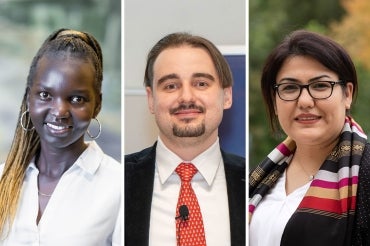
From left to right: Awak Abit Bior, Vadym Lytvynov and Ghizal Haress (supplied image, Jenna Muirhead, Johnny Guatto)
Published: May 28, 2025
An undergraduate economics student who was born in South Sudan and raised in a refugee camp in Kenya. A graduate of a University of Toronto master’s program who was displaced from Ukraine after the Russian invasion. A constitutional lawyer and scholar who fled Afghanistan after the Taliban seized power.
With the help of U of T’s Scholars-at-Risk Award Program, Awak Abit Bior, Vadym Lytvynov and Ghizal Haress rebuilt their lives and careers in Canada after fleeing conflict and persecution in their home countries. The fellowships provide $10,000 per year to students whose studies have been impacted by war and upheaval – and supported 50 students from 13 countries last year alone. Established professors who are awarded a fellowship are hired by departments or faculties as visiting scholars.
Bior, Lytvynov and Haress recently shared their experiences during a panel discussion moderated by physician James Orbinski, a professor in the Temerty Faculty of Medicine and principal of Massey College.
“We are privileged to be engaging with three outstanding scholars who are also Scholars-at-Risk,” said Orbinski, who accepted the 1999 Nobel Peace Prize on behalf of Médecins Sans Frontières and brought his experience working in diverse conflict areas to the discussion.
Orbinski thanked the panelists for sharing their “deep personal and intellectual experiences” – which he noted offer insights into the challenges faced by global communities amid geopolitical tensions, authoritarianism and “the fraying of an international system of institutions, law, norms and values.”
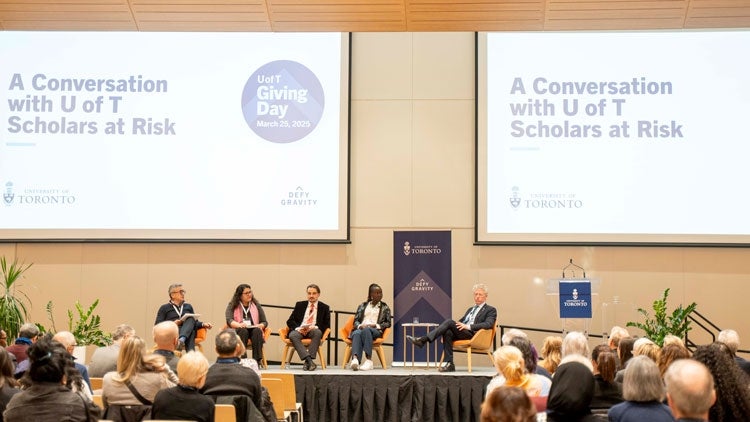
“The kind of courage that it takes for these Scholars-at-Risk to not only put their lives at risk in their home countries and home societies, but to then come … and start their lives elsewhere and continue their studies here at the University of Toronto – it’s that courage that always strikes me as extremely profound,” Joseph Wong, U of T's vice-president, international, said at the event.
Similarly, David Palmer, U of T's vice-president, advancement, said international scholars make enormous contributions to U of T – and that the Scholars-at-Risk program and those who support it are “a wonderful example of the role that institutions like the University of Toronto can and must play in the world around us.”
Here’s what Bior, Lytvynov and Haress had to say about their journeys – and the role of universities in supporting those seeking sanctuary:
Awak Abit Bior
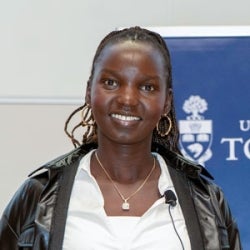
A third-year honours bachelor of arts student, Bior is majoring in economics with minors in applied statistics and psychology. She’s also interning with TD Bank, where she is refining her skills in data analytics and automation to improve operational efficiency.
Bior has had to navigate numerous challenges to get to this point. Originally from South Sudan, she grew up in a refugee camp in Kenya, where her family still lives today.
Arriving at U of T in early 2022, Bior said it wasn’t always easy adjust to life in Toronto – she was away from her family for the first time, found herself navigating Ontario’s various pandemic-related restrictions that year and, like many newcomers to the country, experienced her first-ever Canadian winter.
Bior sent money back home to support her family – particularly her younger brother, who was hospitalized with cerebral malaria – so resources were strained.
Realizing she would soon need additional resources to continue her studies, Bior applied for – and received – a Scholars-at-Risk award. “When I got that money, it was able to relieve me from the mental stress and financial stress that I had,” she said.
Bior said she wishes more young people around the world could have access to similar opportunities.
“I know there are so many young girls and boys out there who yearn for education, but they don’t have the opportunity because of whatever is happening in their countries … and don’t have anybody to finance their education or help them sustain their lives.”
Vadym Lytvynov
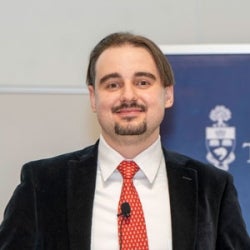
Lytvynov was at his parents’ apartment in the Ukrainian city of Kharkiv when Russia began its invasion in February 2022 – launching air and artillery strikes that forced public institutions and services to shut down. “We had to melt snow in the bathtub to have water,” he recalled.
A trained physician, Lytvynov volunteered with the Red Cross before making his way to Canada – via a series of refugee camps in Europe – to pursue graduate studies at U of T’s Temerty Faculty of Medicine.
In addition to the academic opportunities, Lytvynov highlighted the social connections he made at U of T, which he said played a key role helping him adjust to life in Canada.
“Massey College introduced me to a lot of people who became my friends. Some of them became my mentors – it became my second home outside of home,” he said, “and the financial support made it possible for me to continue my studies.”
Lytvynov has since successfully pursued a new career path, completing a master of science degree in biomedical communications at Temerty Medicine and landing a job at AstraZeneca, a multinational pharmaceutical company.
Ghizal Haress
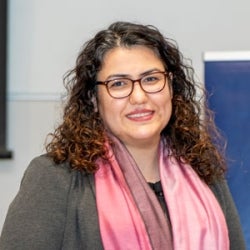
Born in Kabul, Haress grew up as a refugee in Pakistan before returning to Afghanistan after the U.S.-led invasion. She completed her studies in constitutional law before becoming a professor and, eventually, Afghanistan’s first presidential ombudsperson.
But when the Taliban seized power in 2021, Haress and her family were forced to become refugees once again, spending several months in Albania before landing in Toronto.
“I was very happy and lucky that I ended up in Canada of all places. We were met with a lot of kindness,” Haress said.
Appointed a visiting scholar in the Faculty of Law and the Munk School of Global Affairs & Public Policy in the Faculty of Arts & Science, Haress said she felt respected and valued by U of T’s academic community.
“Being appointed as a visiting scholar allowed me to move beyond the identity of a refugee,” she said. “For the first time since leaving Afghanistan, I was recognized for my professional identity – as a scholar and professor – rather than solely as a refugee.”
Haress is now program director of an Afghan women’s academic support program run through Massey College and an adjunct professor of law at both U of T and York University. She urged other universities to look at U of T’s Scholars-at-Risk program as a model and welcome more vulnerable students and academics from abroad.
“We need to be aware that there are thousands of people like us around the world who are at risk of persecution by their governments just because they're in pursuit of knowledge – that's the only thing they've done,” Haress said. “Who knows what kinds of discoveries they are going to make, what kind of achievements they’re going to have – you never know, they might end up being a Nobel Laureate. That, to me, is an investment that a university can make.”



